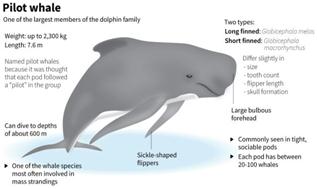

More than 100 whales stranded on a Sri Lankan beach have been guided to the sea in an overnight rescue operation
Context
More than 100 whales stranded on a Sri Lankan beach have been guided to the sea in an overnight rescue operation.
About
- Cetacean stranding, more commonly referred to as beaching, refers to the phenomenon of dolphins and whales stranding themselves on beaches.
- Whales are known to strand themselves on beaches across the world and they do so singularly or in groups.
- While individual strandings are mostly attributed to injury or sickness, it is not clear why exactly whales beach themselves in groups.
Why Whales strand?
Strandings are complex events and there are many reasons why dolphins and whales may strand. In most cases the exact cause is unknown but any one of the following factors, or a combination of them, can be the cause.
- Old or sick:Old whales may find it difficult to keep up with their pod or resist heavy swells or inshore currents. Because of failing strength these animals may strand.
- Injured:Whales that escape net entanglements or are hit by vessels may sustain serious injuries, such as broken teeth and jaws, deep lacerations, flipper dislocations or fractures, spinal or muscle damage or severed fins or flukes.
- Navigational errors:When chasing prey, whales may accidentally beach themselves. They can be picked up by a wave and thrown onto a beach or be left high and dry by the receding tide
- Social bonding:The strong social bonding of some species of whales can cause mass strandings. Whales that strand in groups are usually deep water species with highly evolved social structures.
- Pilot whales -- which can grow up to six metres (20 feet) long and weigh a tonne -- are highly social.
- Pilot whales -- which can grow up to six metres (20 feet) long and weigh a tonne -- are highly social.
- There are two species of pilot whales – long finned and short finned.
Which human influences exacerbate the situation?
- In addition to natural factors, man-made underwater noise from ships, icebreakers, drilling platforms or military sonar equipment can also massively impair the orientation and communication of marine mammals.
- They flee the strong sound waves in a state of confusion.
- And since the density of water is much higher than that of air, sound propagates underwater about five times faster than in the air.
- Military sonar operations employing very loud sounds have particularly drastic effects.
- The sonars, which are louder than 200 decibels, triggered the formation of gas bubbles in the blood vessels and organs of marine mammals (as happens with diving sickness), obstructing the blood supply and leading to their death.



